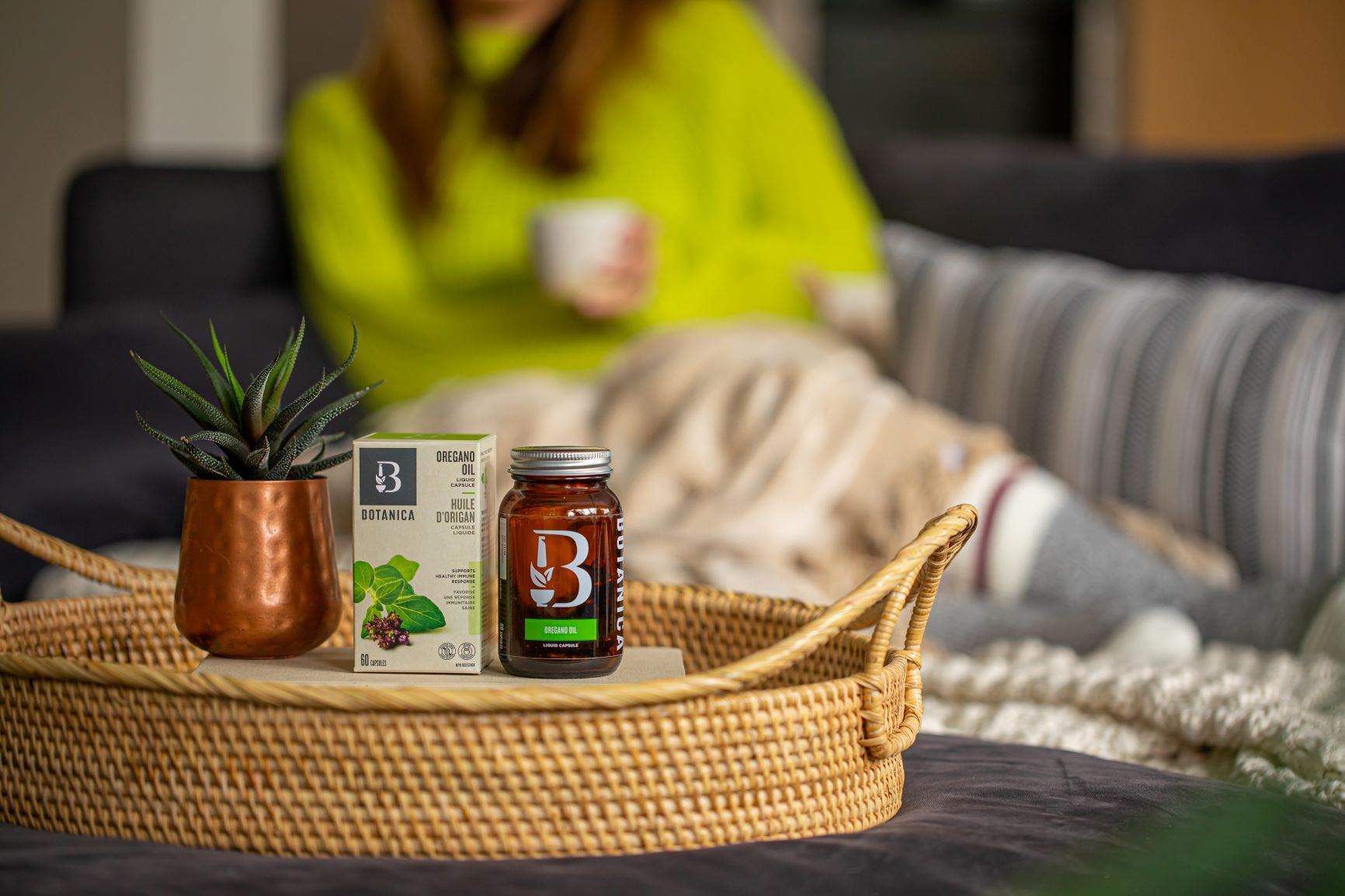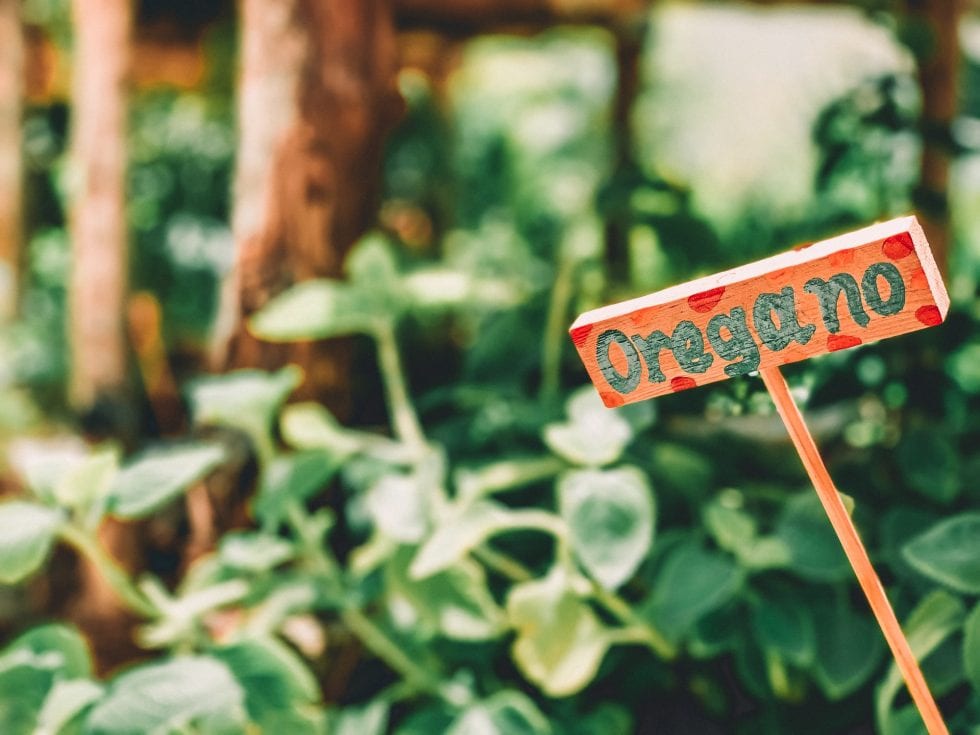A guest blog by Jane Reside, ND via Botanica
This is the strangest September I can remember – normally my office is bombarded with calls to boost immunity and deal with late summer colds, wondering what to do about the flu that will soon show up. But our thoughts are elsewhere, and late summer colds have barely happened. Do you still need to think about a good immune boost, and some tools on hand to treat infection? Absolutely. Let’s find some normalcy while we focus on one of my favourite herbs to turn to at this time of year: Oregano.
Not just a delicious culinary herb — although we are entering the season for soups & stews, spiced dishes, roasted winter veggies — oregano has become one of the most popular herbs for its medicinal properties, particularly for fighting infections like colds & flu, and boosting immunity. This is one impressive herb. I am always delighted when a traditional remedy has not only proven itself time and time again in its popular use, but also stands up to the scrutiny of medical science and rigorous research – and oregano fits the bill.
ORIGINS OF OREGANO
Known by its Latin binomial, Origanum vulgare, oregano is native to the Mediterranean region and has a long history of use, going back to ancient Greek and Roman times — according to Greek mythology, oregano was believed to have been created by Aphrodite as a symbol of happiness, and this lovely flowering herb was often used in marriage ceremonies to bring joy to the happy couple. In modern-day aromatherapy, we know that the volatile oils in oregano – the carvacrol, thymol, and pinene – are responsible for the lift in energy and mood when we breathe it in. Medicinal applications as an antimicrobial have a long history of use as well — Hippocrates himself was the first physician to recognize oregano’s ability to counter infection, crushing it and applying it to wounds, to the chest for respiratory distress, and adding it to wine for convalescence 1.
CURRENT RESEARCH
Currently, oregano is most widely known for its antimicrobial properties – it works against viruses, bacteria, fungi, gut parasites, and even head lice. More specifically, research has shown efficacy in the treatment of infections like Helicobacter pylori (the bacteria responsible for stomach ulcers), Candida – the cause of yeast infections – and other fungal overgrowth (such as athlete’s foot), and it has a long history of use in respiratory infections. Studies have shown specific activity against E.coli, Citrobacter, Salmonella, Pseudomonas, Klebsiella, Shigella, and several other pathogenic gram-negative bacteria 2. These tend to be gut-oriented pathogens, making oregano useful in treating intestinal infections; E.coli is also the main culprit in urinary tract infections, another terrific application for oregano. But oregano has been shown to act against some gram-positive bacteria as well, the ones that can cause skin infections – like Staphylococcus species — and organisms we ingest from contaminated food, like Clostridium 3. To round out this herb’s place in your medicine cabinet for infections, we know that oregano also provides support to the immune system, by way of modulating certain cytokines that are responsible for many of the symptoms we get when we’re sick.
Oregano also has other medicinal properties that don’t get much public attention. Studies using oil of oregano show strong antioxidant capacity — the ability of a substance to bind to free-radicals and thus decrease the oxidation that ultimately damages our cells and tissue, even our vulnerable DNA. This implicates oregano in its ability to protect us from inflammation, arterial plaque formation, rapid aging (maybe this is the secret of Mediterranean herbs in healthy aging…), and even inhibits certain cancer pathways 4,5. There is evidence as well that oil of oregano has anti-inflammatory properties, and in this way can reduce pain. Various studies on its anti-inflammatory activity show promise for topical use to treat contact dermatitis 5; others indicate that the oil can decrease gastric ulcers 6 and contribute to the repair of ‘leaky gut’ 7. Decreasing inflammation also seems to be at the heart of oregano’s ability to lower cholesterol and triglycerides, making this a valuable herb for cardiovascular disease. 8
WHAT’S IN OREGANO THAT DOES ALL OF THIS?
Everyone will recognize the strong aroma of oregano, particularly in the oil – this is due to its volatile oils (terpenes and phenols), the constituents responsible for most of oregano’s medicinal activity. Two of these volatile oils — carvacrol and thymol — seem to be the key players responsible for oregano’s cytotoxic, antioxidant, and antimicrobial action. Botanica’s Oregano Oil products are steam-distilled, preserving the integrity and activity of these volatile oils. Taken internally, oregano fights systemic infections, digestive upset, UTI’s, and pain – like the body aches you get when you’re sick. Used topically — always use a carrier oil — the volatile oils can prevent skin infection and decrease inflammation locally. This amazing little plant also has bitter properties – that may sound awful, but in fact this is a huge plus: bitter foods, sometimes known as carminitives, are nature’s way of stimulating the digestive system to work better at breaking down our food.
HOW SHOULD OREGANO BE TAKEN?
We all know about oil of oregano — this is the form that works best for fighting infections. Botanica has two strengths in oil form: Oregano Oil Regular Strength, and Oregano Oil Extra Strength. The beauty of the oil is that you can control your dose, depending on age, need, tolerance, digestive function, state of your health….. and the added benefit, by tasting it on your tongue, is the bitter stimulation of your digestive system, so you can take it just before meals. Use the Regular Strength if you’re pretty healthy but you know there’s a bug going around; use the Extra Strength if you’re run down and you know you’re a bit more vulnerable. And if taste is an issue — let’s face it, oregano oil is not everyone’s cup of tea — you can try the Oregano Oil Liquid Capsule.
Speaking of tea, an infusion of the dried herb can be effective as well – in fact there are many ways you can take oregano, from mixing it with warm apple cider on the scalp to eradicate head lice, to using the boiled tea leaves as a poultice for a skin infection, to adding a few drops of the oil with some salt to a steam for clearing out the upper respiratory system, and of course adding it to your food for its amazing flavour and its health-giving properties.This Fall and Winter, let’s remember Oregano. This ancient herbal remedy deserves the hype. Keep a bottle of the oil in your medicine cabinet all Fall and Winter, it’s just that easy.


